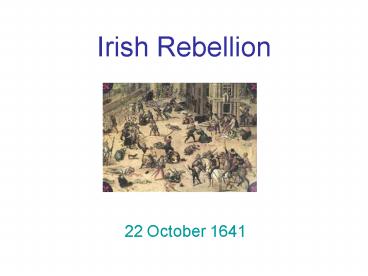Irish Rebellion - PowerPoint PPT Presentation
1 / 20
Title:
Irish Rebellion
Description:
... this people, or securing this kingdom under the dominion of your imperial Crown. ... in the winter; and on the Sabbath day put to flight but had no place to ... – PowerPoint PPT presentation
Number of Views:394
Avg rating:3.0/5.0
Title: Irish Rebellion
1
Irish Rebellion
- 22 October 1641
2
Causes
- Tudor Stuart Plantation policy
- Wentworth Lord-Lieutenant (1633-40) ? alienated
all interest groups (policy of thorough a
means of 'civilising...this people, or securing
this kingdom under the dominion of your imperial
Crown.) - Replaced by Sir John Borlase Sir William
Parsons who continued to govern ruthlessly, but
lacked Wentworths ability to control - Encouraged by Scottish defiance the success of
the Covenanters
3
- Kings visit to Scotland ? looked on the verge of
agreeing to a more radical Protestant policy. A
Presbyterian settlement could only mean further
religious discrimination and loss of land for the
old Catholic families.
4
Disgruntled by the persecution they encountered
following the Nine Years War (1594- 1603), one
hundred aristocrats and gentry from Ulster
(including the Earls of Tyrone and Tyrconnel)
fled the country in 1607, going into exile on the
continent. The Crown claimed the 4m acres they
left behind (mainly in Ulster).
Above map highlighting Ulster
5
By 1620 approximately 40,000 Scottish
Presbyterians had settled in Ulster By 1641,
approximately 100,000 Scottish and English
Protestants had settled in Ulster.
6
Catholic land ownership
7
Events
- Key castles and strongholds were captured or
besieged - Protestant settlers were evicted from their
lands, farms were burnt, cattle stolen - Over 4,000 Protestants were murdered (12,000
killed if include those left to die of exposure
stripped not only of propery but also clothing),
often at the instigation of Catholic priests who
stirred up religious hatred - In one notorious incident, the Protestant
inhabitants of Portadown were taken captive and
then massacred on the bridge in the town. - Early parliamentarian pamphlets claimed that over
100,000 settlers had lost their lives - Many Protestants fled as refugees to England
8
- The priests told the people "that Protestants
were worse than dogs, they were devils and served
the devil, and the killing of them was a
meritorious act."
9
- The general character of the Rebellion may,
perhaps, be gathered from the following extract
from Clogy's Life of Bedell- - There was no people under Heaven lived in a
more flourishing state and condition for peace
and plenty of all things desirable in this life,
when, on a sudden, we were turned out of house
and hold, and stripped of all outward enjoyments,
and left naked and bare in the winter and on the
Sabbath day put to flight but had no place to
flee to.
10
Impact on English politics
- Reports of wholesale massacres and atrocities
spread like wildfire through England and
Scotland, provoking fears of an international
Popish conspiracy. - At Westminster, John Pym used the situation to
political advantage, implicating the King's
ministers in the "conspiracy" and suggesting that
the King himself was not to be trusted with
control of the army that would be required to
quell the rebellion. - Parliament voted to raise forces of its own under
the Militia Bill and passed the Adventurers Act
in March 1642, which promised land in Ireland to
speculators who financed the raising of troops.
11
- THE ACCOUNT OF ELIZABETH PRIZE OF ARMAGH
- And as for this deponent and many others that
where stayed behind, diverse tortures were used
upon them..... and this deponent for her part was
thrice hanged up to confess to money, and
afterwards let down, and had the soles of her
feet fried and burnt at the fire and was often
scourged and whipt.... - And a great number of other Protestants,
principally women and children, whom the rebels
would take, they pricked and stabbed with their
pitchforks, skeans and swords and would slash,
mangle and cut them in their heads and breasts,
faces, arms, and hands and other parts of their
bodies, but not kill them outright but leave them
wallowing in their blood to languish and starve
them to death.
12
(No Transcript)
13
(No Transcript)
14
(No Transcript)
15
(No Transcript)
16
(No Transcript)
17
(No Transcript)
18
(No Transcript)
19
(No Transcript)
20
- 'though Scotland blew the first trumpet, it was
Ireland that drew the first blood and if they
had not at that time rebelled, and in that
manner, it is very probable all the miseries
which afterwards befell the king and his
dominions had been prevented'. - (Earl of Clarenden)































